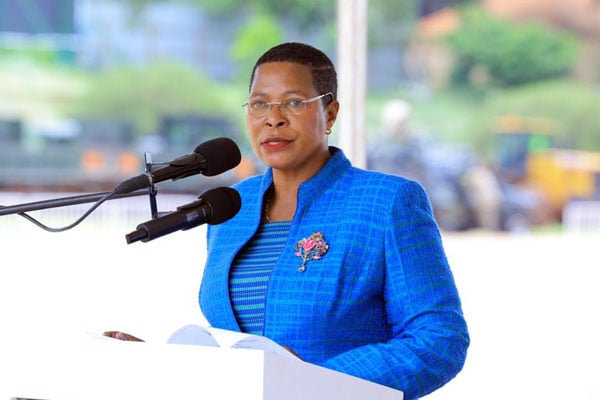Sensitise public on anti-gay law

Bubulo East MP John Musila displays his anti-gay attire during plenary at Parliament on March 21. The Uganda government is worried that its US counterpart could stop HIV/Aids support over the anti-gay law. PHOTO/FILE.
What you need to know:
- The idea that anything may be done against LGBTIQ people legally will be much diminished by the court’s nullification of the aforementioned clauses
After the Anti-Homosexuality Act, 2023, was passed and eventually assented to by the President last year, many law enforcers such as police, prosecutors and judicial officers were accused by pro-LGBTIQ crusaders of misinterpreting the law. This forced the Director of Public Prosecutions to issue guidelines to all prosecutors on how to handle related cases.
Last week, the government and religious leaders welcomed a Constitutional Court verdict upholding the same law despite an announcement by petitioners earlier in the day to take the legal battle to the Supreme Court. But Parliament said it would not back down from its defence of Ugandan values through legislation.
In summary, the Constitutional Court annulled parts of the law that had criminalised the letting of premises for use for homosexual purposes, and the engagement in acts of homosexuality by anyone which results in the other person contracting terminal illness. Also, the court nullified Section 14 of the Act that put a burden on anyone who failed to report acts of homosexuality to police. This means that church leaders, relatives, advocates, researchers, and journalists, among others are free to continue doing their work without fear of reprisal for not reporting.
The Constitutional Court also released health workers from the obligation of reporting suspected LGBTIQ people, aimed at upholding the right to healthcare access for everyone, regardless of their sexual orientation. Professionally, healthcare workers have an obligation to keep their clients’ information private.
Before the court ruling, healthcare workers were aggressively encouraged to violate this code of ethics under Section 14(2), which offered incentives under the Whistleblowers’ Protection Act, in addition to immunity from legal repercussions for such violations. Therefore, in light of this ruling, professionals—including healthcare providers—who violate their professional duties in order to report suspected LGBTIQ individuals may face legal and disciplinary action for violating confidentiality and privacy rights of their patients.
The idea that anything may be done against LGBTIQ people legally will be much diminished by the court’s nullification of the aforementioned clauses. Initially, there was a widespread belief in the West that LGBTIQ people in Uganda are wholly unacceptable and that, as a result, anyone could treat them however they pleased without facing consequences. It is now evident that LGBTIQ people are free to rent houses, seek counselling, have access to healthcare, and are not obligated to be reported by others simply because they believe someone to be LGBTIQ. These aspects need to be known by all to curb impunity, misinformation and propaganda against the anti-gay law.




